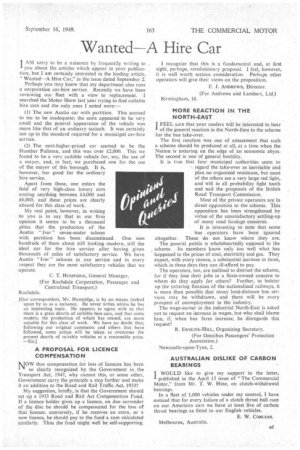Wanted—A Hire Car
Page 39

If you've noticed an error in this article please click here to report it so we can fix it.
I AM sorry to be a nuisance by frequently writing to 1 you about the articles which appear in your publication, but I am certainly interested in the leading article, " Wanted—A Hire Car," in the issue dated September 2. . Perhaps you may know that my department also runs a corporation car-hire service. Recently we have been . reviewing our fleet with . a view to replacement. I searched the Motor Show last year trying to find suitable hire cars and the only .ones I noted were:—
(1) The new Austin car with partition. This seemed to me to be inadequate; the seats appeared to be very small and the general appearance of the vehicle was more like that of an ordinary taxicab. It was certainly not up to the standard required for a municipal car-hire service.
(2) The next-higher-priced ear seemed to be the Humber Pullman, and this was over £2,000. This we found to be a very suitable vehicle for, say, the use of a mayor, and, in fact, we purchased one for the use of the mayor of this borough. It is, however, too good for the ordinary hire service.
Apart from these, one enters the field of very high-class luxury cars costing anything between £4,000 and £6,000, and these prices are clearly absurd, for this class of work.
My real point, however, in writing to you is to say that in our firm opinion it seems to be a thousand pities that the production of the Austin " lver " seven-seater saloon
• with partition has been discontinued. One sees hundreds of them about still looking modern, still the ideal car for the hire service after having given thousands of miles of satisfactory service. We have Austin "Iver " saloons in our service and in every respect they are the most satisfactory. vehicles that we operate.
C. T. HUMPIDGE, General Manager, (For Rochdale Corporation, Passenger and Centralized Transport.) Rochdale.
[Our correspondent, Mr. Humpidge, is by no means looked upon by us as a nuisance. He never writes unless he has an interesting topic. He appears to agree with us that there is a great dearth of suitable hire cars, and that some models, the production of which has ceased, are more suitable for this class of work. WE have no doubt that, following our original comments and others that have followed, some action will be taken to overcome the present dearth of suitable vehicles at a reasonable price. —En.] A PROPOSAL FOR LICENCE COMPENSATION NOW that compensation for loss of licences has been so clearly recognized by the Government in. the Transport Act, 1947, why cannot this, or some other, Government carry the principle a step further and make it an addition to the Road and Rail Traffic Act, 1933?
My suggestion, briefly, is that the Government should set up a 1933 Road and Rail Act Compensation Fund. If a licence holder gives up a licence, on due surrender of the disc he should be compensated for the loss of that licence; conversely, if he receives an extra, or a new licence, he should pay to the fund a sum calculated similarly. Thus the fund might well be self-supporting.
I recognize that this is a fundamental and, at first sight, perhaps, revolutionary proposal. I feel, however, it is well worth serious consideration. Perhaps other operators will give their views on the proposition.
E. J. ANDREWS, Director.
(For Andrews and Lambert, Ltd.) Birmingham, 18.
MORE REACTION IN THE NORTH-EAST I FEEL sure that your readers will be interested to hear of the general reaction in the North-East to the scheme for the bus take-over.
The first reaction was one of amazement that such a scheme should be produced at all, at a time when the Nation is tottering on the edge of an economic abyss. The second is one of general hostility.
It is true that four municipal 'authorities seem to -, regard the take-over as inevitable and plan no organized resistance, but most of the others see a very large red light, and will in all probability light tooth and nail the proposals' of the British Road Transport Commission..
Most of the private operators are in direct opposition to the scheme. This opposition has been strengthened by virtue of the unsatisfactory settling-up of many road haulage concerns.
It is interesting to note that some bus operators have been ignored altogether. These do not know where they are.
The general public is wholeheartedly opposed to the scheme. Its members know only too. well what has . happened to the prices of coal, electricity and gas. They expect, with every reason, a substantial increase in fares, which in these days they can ill-afford to pay.
The operators, too, are inclined to distrust the scheme, for if they lose their jobs in a State-owned concern to whom do they apply for others? Further, to bolster up the tottering finances of the nationalized railways, it is more than possible that many long-distance bus services may be withdrawn, and there will be every prospect of unemployment in the industry.
The wage-earner in the industrial North-East is asked not to request an increase in wages, but who shall blame him, if, when bus fares increase, he disregards this request?
R. ERSKINE-HILL, Organizing Secretary. (For Omnibus Passengers' Protection Association.) Newcastle-upon-Tyne, 2.
AUSTRALIAN DISLIKE OF CARBON BEARINGS I WOULD like to give my support to the letter, I published in the April 15 issue of "The Commercial Motor," from Mr. T. W. Hine, on clutch-withdrawal bearings.
in a fleet of 1,000 vehicles under my control, I have noticed that for every failure of a clutch thrust ball race on our American cars we have at least five of carbon thrust bearings as fitted to our English vehicles.
E. W. CORLESS.
Melbourne, Australia.




















































































